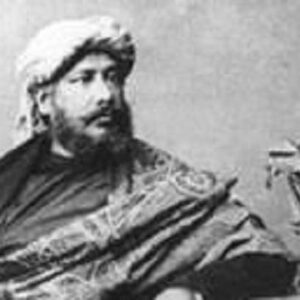Tagore was a religious reformer and Hindu philosopher from India. He was one of the Brahmo religion’s founders. At the age of nine, he began his official education and was taught Sanskrit, Persian, English, and Western philosophy. He was born into a wealthy landowning family. He was drawn to religion and began pondering the purpose and essence of life after being profoundly affected by the death of his grandmother, to whom he was extremely connected. He began an in-depth study of religious literature, particularly the Upanishads, quickly lost interest in earthly matters, and then began his search for the divine. Debendranath Tagore was a very pious individual who disseminated his religious knowledge by establishing the Tattvabodhini Sabha, which he eventually combined with the Brahmo Sabha. His contribution to the Bengal renaissance and the revival of Hinduism is of great importance. As a philanthropist and social crusader who believed in democracy, he influenced a generation of Indians through his activities. Often referred to as “Maharshi,” he was unquestionably one of the greatest Indian-born religious geniuses.
Youth and Early Life
Prince Dwarkanath Tagore, a wealthy landowner, and successful businessman, and his wife, Digambari Devi, gave birth to Debendranath Tagore on May 15, 1817, in Calcutta, Bengal, Bengal Presidency.
In 1827, having received his early education at home, he joined the Anglo-Hindu College. After briefly attending college, he began monitoring his family’s property and showed an interest in philosophy and religion.
In 1838, his grandmother died, and he underwent a psychological transformation. He became intensely devout and began reading the Mahabharata, the Upanishads, and several other religious and intellectual works.
Debendranath Tagore’s Career
Debendranath Tagore founded the Tattwabodhini Sabha in 1839 under the supervision of Pandit Ram Chandra Vidyabageesh to impart his experiences and wisdom. Four years later, he launched the “Tattwabodhini Patrika” to facilitate communication among the community’s adherents.
As secretary of the Tattwabodhini Sabha, he discontinued Hindu puja ceremonies and instituted the ‘Magh festival,’ ‘Nababarsa,’ and similar festivities.
Since the death of Raja Ram Mohan Roy in 1833, the Brahmo Sabha had declined. In 1843, he reestablished it. Later, the Brahmo Sabha formally amalgamated with the Tattwabodhini Sabha and became known as the Calcutta Brahma Samaj.
In 1848, he contributed to the codification of the ‘Adi Dharma Doctrine’ as Brahmo Dharma Beej.
In 1850, he released the book Brahmo Dharma, in which he highlighted the essential concepts of monotheism and rationalism while opposing the necessity of mediation between man and God, caste divisions, and idolatry.
In 1851, he was appointed Secretary of the British Indian Association, an organization whose mission was to represent Indian interests before the British government. As Secretary, he advocated for India’s political independence and tax relief for the poor.
In addition, he fought for universal elementary education in India and founded a Brahmo school. In 1863, he established Shantiniketan, a retreat in rural Bengal, which his youngest son, Rabindranath Tagore, subsequently converted into an international institution.
Debendranath Tagore’s Major Opera
Debendranath Tagore established the Tattwabodhini Sabha to enable talks on various philosophies and later merged it with the Brahmo Sabha. He also introduced the many Brahmo devotional practices that were ultimately adopted by society.
As the influence of Brahmoism grew throughout India under his guidance, he became renowned as a spiritually accomplished individual and acquired the title ‘Maharshi’.
In addition to his involvement in politics, he was appointed Secretary of the British Indian Association. During his time in office, he made unrelenting attempts to remove the chowkidar levy for the poor peasants and pressed the British parliament for India’s political independence.
Personal History and Legacy
He wed Sarada Devi, and the couple was blessed with many offspring, thirteen of whom lived. All of their children went on to make notable contributions in their respective industries.
His eldest son, Dwijendranath, became a gifted scholar, poet, and musician, while his second son, Satyendranath, was the first Indian to join the Indian Civil Services.
His third son, Hemendranath, was a scientist and family organizer, while his other son, Jyotirindranath, achieved fame as a scholar, artist, music composer, and theater figure.
His other sons were Birendranath, Somendranath, and Rabindranath Tagore, who transformed Bengali literature and music and earned the Nobel Prize in Literature.
His daughters were Soudamini, Sukumari, Saratkumari, Swarnakumari, and Barnakumari.
Debendranath Tagore passed away in Calcutta, India, on January 19, 1905, at the age of 87.
Estimated Net Worth
Debendranath is one of the wealthiest and most popular philosophers in history. According to our investigation, Wikipedia, Forbes, and Business Insider, Debendranath Tagore has an estimated net worth of $1.5 million.


